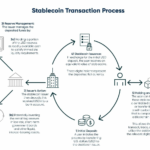In 2025, institutional investment in cryptocurrencies has reached unprecedented levels, with allocations increasing by 87% year-over-year. Assets under management (AUM) in physical Bitcoin exchange-traded products (ETPs) have surpassed $100 billion, signaling a significant shift in institutional confidence towards digital assets.

The Rise of Institutional Investment
A joint survey by EY-Parthenon and Coinbase revealed that 83% of institutional investors plan to increase their crypto allocations in 2025. This trend is driven by the perception of cryptocurrencies as strategic assets capable of delivering attractive risk-adjusted returns.
Bitcoin ETPs Lead the Way
The surge in institutional investment is evident in the growth of Bitcoin ETPs. As of Q1 2025, AUM in physical Bitcoin ETPs exceeded $100 billion, reflecting deep institutional conviction.
Regulatory Clarity and Political Support
The increase in institutional crypto allocations is also attributed to growing regulatory clarity and political support. In the United States, the Securities and Exchange Commission’s approval of spot Bitcoin ETFs has provided a regulated pathway for institutional investors.
Global Expansion of Crypto Products
Asset management giants like BlackRock are increasingly broadening their digital asset portfolios to meet global institutional demand. In a landmark move in March 2025, BlackRock introduced its first Bitcoin exchange-traded product (ETP) in Europe—marking a significant milestone for the adoption of digital assets across regulated financial markets. This launch not only reflects rising investor appetite outside the U.S., but also strengthens the case for cryptocurrencies as part of mainstream investment strategies.
The expansion comes amid rising pressure on global fund managers to offer more blockchain asset investments-aligned products, especially in jurisdictions showing regulatory clarity. As more regions embrace digital asset frameworks, other institutional players are expected to follow suit, launching region-specific products to support both risk-managed exposure and capital inflows into the sector.
Diversification Beyond Bitcoin
While Bitcoin remains the primary focus, institutional investors are diversifying into other digital assets. Surveys indicate that nearly three-quarters of firms hold cryptocurrencies beyond Bitcoin and Ethereum, with altcoins like XRP and Solana gaining traction.
Implications for the Future
The 87% increase in institutional crypto allocations in 2025 marks a pivotal moment in the integration of digital assets into mainstream finance. With growing regulatory clarity, political support, and a broadening array of investment products, cryptocurrencies are poised to become a staple in institutional portfolios.
Stay Ahead with Trusted Education in Digital Asset Markets
Navigate the evolving world of digital assets with clarity and confidence. Kenson Investments provides accessible educational content designed for institutions, startups, and informed market participants exploring blockchain, crypto, and DeFi finance. Whether you’re tracking policy shifts, institutional trends, or tokenized asset strategies, our resources are built to expand your understanding—no financial advice, just objective, data-backed market awareness.
Explore the Knowledge Center to begin your digital asset education today.
Disclaimer: The information provided on this page is for educational and informational purposes only and should not be construed as financial advice. Crypto currency assets involve inherent risks, and past performance is not indicative of future results. Always conduct thorough research and consult with a qualified financial advisor before making investment decisions.
“The crypto currency and digital asset space is an emerging asset class that has not yet been regulated by the SEC and US Federal Government. None of the information provided by Kenson LLC should be considered as financial investment advice. Please consult your Registered Financial Advisor for guidance. Kenson LLC does not offer any products regulated by the SEC including, equities, registered securities, ETFs, stocks, bonds, or equivalents”














